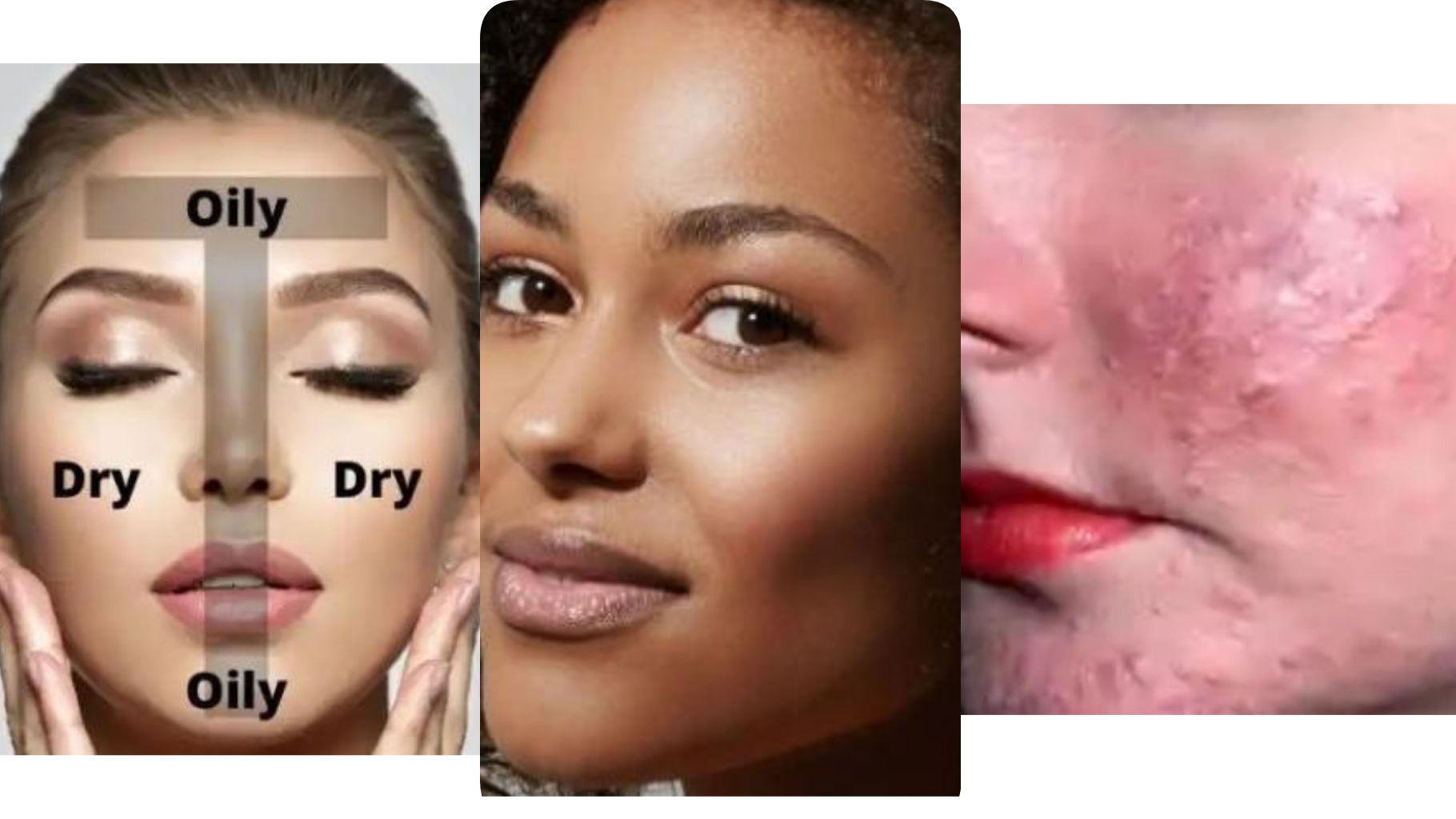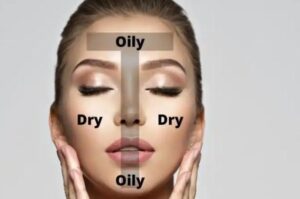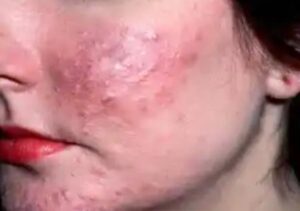Beauty
How To Know Your Skin Type & How To Take Care Of Oily Skin

We have different types of skin and this could be as a result of different factors. This article will help you know how to know your skin type and how to take care of oily skin, not just that, it will help you know the cause of the type of skin you have and how to maintain your skin or help it get better.

Just before we start treating the type of skin, you should know that one cannot retain same skin till old age. Aging brings a different type of skin so don’t feel bad if your nice skin starts changing when you begin to grow old.
What Are The Different Types Of Skin?
We have five (5) different types of skin.
Normal skin:
This type of skin is seen as a healthy and well balanced skin.
Dry skin:
This skin produces less sebum which results to lack of lipids needed to retain moisture.
Oily skin: This type of skin produces high sebum.


Combination skin: This is a mixture of dry skin and oily skin.
Sensitive skin: This type of skin is very reactive and is easily irritated.
How Can I Know My Skin Type?
Let’s conduct a quick test which will enable you know your skin type.
Use of Blotting Sheet:
Wash your face with a mild cleanser and then gently dry it and allow it to stay for thirty minutes. In this thirty minutes, ensure you don’t touch your face. After thirty minutes, press a blotting sheet on your face.
Take the sheet close to the light to get a better view. If the sheet shows much oil on all areas of your face, you have an oily skin. If it shows little or no oil on all areas of your face, then you have a dry skin. If it shows small amount of oil on your tzone areas which are your nose, forehead and chin, know you have a combination type of skin and then, if the sheet shows a small amount of oil on every area of your face, you have a normal skin.
Another way to test your skin type is by washing your face with a gentle cleanser. After doing that, leave your face to rest for an hour without touching it. If after an hour your skin looks shiny on the nose or forehead, you have the combination type of skin while if it feels tight, know you have a dry skin.
Now you have known your type of skin, let us see the causes of your skin type, treatment and other things you should know about your skin type.
Oily Skin:
An oily skin is a skin that produces high sebum that keeps the skin soft and hydrated. Production of androgens in the body leads to a high increase in the production of sebum. Sebum is an oily susbstance. An oily skin has obvious pores, thicker or pale skin and most importantly, this type of skin is prone to blackheads and whiteheads. Blackheads occur when oil becomes trapped in your pores and then mixes with dead skin cells causing a plug. When this plug opens to the air, it results to blackheads but when closed, it forms a whitehead.
What Are The Causes Of Oily Skin?
Stress
Genetics
Climate. A humid or hot environment can cause an oily skin
Hormonal imbalance. Those experiencing puberty can suddenly have an oily skin same as pregnant women.
The use of harsh chemicals
How To Care Of Oily Skin
Bath twice a day or whenever you over sweat.
Don’t pop pimples on your face and avoid touching your face constantly
Exfoliate your skin with products that contain salicylic acid. Salicylic acid is a natural exfoliant.
You can use bioClarity acne treatment gel.
Use light moisturizers
Avoid thick makeups that may block pores
Drink water
Now you’ve known how to know your skin type and how to take care of oily skin, let’s see the skin condition that affects those with oily skin.
Skin Condition That Affects Oily Skin
Seborrheic Dermatitis:
This is a skin condition that affects mostly those with oily skin. It is caused by an inflammatory reaction to excess malassezia yeast on the skin surface. One with seborrheic dermatitis usually has red rashes and may feel itchy sometimes, not just that, it causes scaly patches and dandruff on the scalp and eyebrow. Symptoms of this skin condition can be found behind the ears, in the eyebrows, in the beards, around the nose or on the upper chest. It is treated using antifungal shampoo, cream or body wash. New-born babies and adults who are within the age of thirty to sixty are more prone to getting it. The good news is that is not contagious.
Having known how to know your skin type and how to take care of oily skin, we bring you other skin types and ways to take care of them.
Normal Skin:
A normal skin which is scientifically known as eudermic, is an healthy or a well balanced skin. A normal skin has a good circulation of blood. You will know if your skin is normal if there are fine pores in your skin. A normal skin is very smooth, soft and even, it has no blemishes and is not prone to sensitivity. It is common in people who are younger.
How Do I Care For A Normal Skin?
Always stay hydrated, that is to say you should drink water more often
Wear a sunscreen. Ensure you avoid direct exposure to the sun because this can lead to dryness of the skin. Use a sunscreen with SPF 30 or above.
Remove all forms of make up before going to bed at night
Wash your face before sleeping
Moisturize your body.
Use a serum which contains vitamin C
Avoid the use of soap for facial cleansing. You can use a Nivea facial cleanser
You can also use Skin EssentiA
What Is The Skin Care Routine For Normal Skin?
Cleanse
Tone
Use of serum
Use of eyecream
Moisturize
Use of night cream
Dry Skin:
Dry skin which is also called xerosis produces less sebum. Dry skin occurs to both genders when they begin to age but aside aging, women are prone to having a dry skin when compared to men.
What Are The Causes Of Dry Skin?
Lack of water through perspirationLack of epidermal lipids like fatty acid and cholesterolLack of natural moisturizing factorGenetics
Long showers
We have different categories of dry skin. We have the mildly dry skin, very dry skin and extremely dry skin.
Mildly Dry Skin: This type has low skin elasticity, feels rough and tight.
Very Dry Skin: This type of dry skin causes a feeling of tightness, it is sensitive to irritation, redness and flakiness in patches.
Extremely Dry Skin: This type of dry skin looks rough, it cracks and causes frequent itching. The hands, feet, elbows and knees are usually dry.
However, this is mostly experienced by aged people.
Tips To Help Those With Dry Skin
Don’t scrub while bathing
Rub a rich moisturizer after bathing
Use gentle cleansers
For more information about dry skin, please check the previous article HERE.
Combination Skin:
This is a mixture of dry skin and oily skin. The cheeks are normal or dry while the tzones which are the forehead, nose and chin are oily. The chin, nose and forehead are prone to acne and the pores on these areas are large. Those with this type of skin usually have a patchy makeup by midday and also have an oiler in summer and drier one in winter.
What Are The Causes of Combination Type of Skin?
Harsh products
Climate
Genetics
How To Care For Combination Skin
The skincare routine you use for your face should be different from the one you use on your tzone
Use oil free and fragrance free products.
Use products that have plant extract like cucumber, green tea
Exfoliate your skin
Avoid using products that clog your pores
Exercise
Wear a sunscreen
Don’t overstress yourself because stress can aggravate some pre existing skin conditions
Avoid toners with fragrance or natural oil
Avoid using products with ingredients which cause irritation. E.g., alcohol, menthol, etc.
Don’t use a harsh cleanser as doing so will destroy your skin barrier and remove necessary oil
Skin Condition Associated With Combined Skin
Rosacea:
This skin condition causes swelling on the face and is accompanied with pimples and redness. There could be larger poles, bumps on the eyelids, stinging and burning of the skin. It is common among those with dry skin, oily skin and combined skin. Rosacea could come as a result of mites on one’s skin and an overactive immune system.
Sensitive Skin:
This type of skin is very reactive and easily gets irritated. It feels itchy whenever you put on a tight clothes, it reacts to some skincare products and also reacts to spicy food.
How to Care For Sensitive Skin
Use moisturizers or toners with humectants like glycerine, shea butter and hyaluronic acid
Avoid using a product with fragrance
Avoid the use of essential oils like citrus, mint, lavender oil, etc
Avoid alcohol
Avoid using chemical sunscreen
Avoid using a product with sodium lauryl sulphates
Regardless of the type of skin you have, you should always cleanse, tone, moisturize and use a sunscreen.

